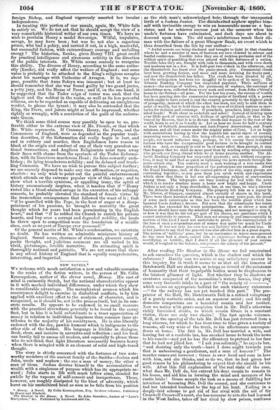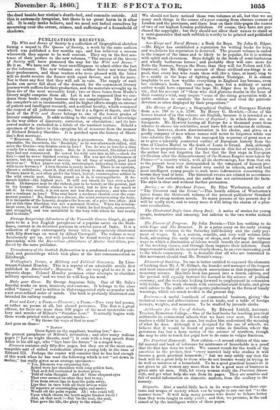NEW NOVELS. *
WE welcome with much satisfaction a new and valuable accession to the ranks of the fiction writers, in the person of Mr. Colin Kennaquhom, author of the clever novel, Money. His cast of i
mind s eminently Scotch, but the national characteristics appear in it with marked individual differences, under which they show to considerable advantage. The metaphysical acumen which his countrymen delight to exercise in dialectical conflicts, is by him applied with excellent effect to the analysis of character, and is recognized, as it should be, not in the process itself, but in its con- crete results. He appears to be endowed in no small measure with the practical shrewdness generidly to be fou-nd in the canny Soot, but in him it is held subordinate to a truer appreciation of money in relation to individual happiness than common fame at- tributes to the majority of his countrymen. He is also liberally endowed with the dry, pawkie humour which is indigenous to the other side of the border. His language is lifelike in dialogue, fresh, clear, and incisive in narrative and-reflection ; and his book can hardly fail to amuse all readers, and especially to please those who do not think that light literature necessarily becomes heavy when there is mingled with it an element of solid and high-toned thought.
The story is chiefly concerned with the fortunes of two note- worthy members of the ancient family of the Smiths—Joshua and John, uncle and nephew ; the one a man of money, the ether a man of ideas. Joshua devotes himself to the accumulation of wealth with a singleness of purpose which 'has its appropriate re- ward; John starts in life with much loftier aims, clouded- for awhile by the vapours of self-conceit and inexperience. These, however, are roughly dissipated by the blast of adversity, Which burst on his unsheltered head as soon as he falls from his position
• Money. A Novel. By Colin Kennaquhom, Esq. In three volumes. Publishep by Burst and Blackett.
The Shadow in the House. A Novel. By John Saunders, Author of "Love's Martyrdom," Stc. Published by Lockwood and Co.
as the rich man's acknowledged heir, through the unexpected birth of a Joshua Junior. The disinherited nephew applies him- self with invincible energy to win an honourable name as a bar- rister, and he achieves success just at the moment when his uncle's fortunes have culminated, and dark days are about to descend upon him. The old man's misfortunes reach their cli- max with the failure of a great Glasgow. Bank, an event which is thus described from the life by our author-
" Awful secrets are being disclosed and brought to light in that chamber where he and a number of men of business are now closeted in solemn and fearful conference. Terrible tales they are of reckless profusion and of the wildest spirit of gambling that ever played with the fortunes of a nation. Terrible tales they are, fraught with ruin to thousands, and with even death and madness not to a few. It is half-past two o'clock in the afternoon, and • the thunderbolt has burst over the panic-struck city. Commercial clouds have been growing darker, and more and more lowering for weeks peat; and now the thunderbolt has fallen. The crash has been dreaded by all, vet the anticipation has been too dre4.1ful to be spoken of by many.. The 'Atlantic Banking Company has inispended payment. Three millions of money—the savings of widows, the patrimony of orphans, the earnings of industrious men, collected from every nook and corner, from John o'Groat's house to the Solway—all gone. For the last ten years, the stream of wealth has been pouring into the commercial metropolis of Scotland with a power which ought to have raised it and the country generally to the highest pitch of prosperity, instead of which the effect has been not only to sink them in point of wealth, but to hold them up in the eyes of civilised nations as spec- tacles for derision and contempt. 0 preachers, preachers, hide your dimin- ished heads ! Walk about in sackcloth and ashes! Instead of looking upon your little nook of creation with feelings of spiritual pride, as that so fli- voured.by Heaven, that it is to dictate creeds and dogmas to the rest of the world, learn to see it as it really is. Let us hear no more for halfa century at least of Sabbath Associations and Anti-Popery Associations, and Negro missions, and all that comes under the mighty name of Cant. Let us begin with associations having in view the humble but useful object of morally improving ourselves. And, this being effected, as we are an enterprising people, our moral influence may, perhaps, be felt among those beingtecdt nations who have the inexpressible good fortune to be brought in con with us. And, as example is said to be of more effect tban precept, it may thus happen that we shall do- more good than by sending away missionaries who preach one thing abroad while we at home practise another. The At- lantic Banking Company has suspended payment ; and, without exaggera- tion, it may be said that as quick as lightning the news spreads through the panic-struck city. You scarcely meet a man walking at a rate under five miles an hour. .A large proportion of the pedestrians arc running. About the Royal Exchange, and, in the central parts of the eity;eager.groups are conversing together ; as you pass them you catch words and expressions which show that there is but one all-engrossing subject of conversation among them. The telegraphs are busy sending far and wide the news which is to render desolate many a home now bright and happy. Uncle Joshua is not only a large shareholder, but, at one time, he was a director in the Atlantic Banking Company. The property left him as a legacy by Mr. Glover, of Glasgow, consisted almost entirely of shares in this bank. Them were three hundred of them. . For a good many years past, the dread of some such catastrophe as this has been the terrible ghost which has haunted Uncle Joshua's dreams. But now that the catastrophe has taken place, it has exceeded his worst anticipations. How so clever a man of business should have seen the mischief coming, anti not managed to stop.it, or how it was that he did not get quit of his shares, are questions which I cannot undertake to answer. That men act strangely and unaccountably in matters of this kind I need not undertake to prove. The contemplation of the loss of such a stupendous sum of money was quite too much for Uncle Joshua. It was not only his own loss and liability which affected him. It is but justice to say that the general loss also affected him in a great degree. The notion of millions' gone, lost by an institution in whose management he has once had a share, caused him to experience feelings so sharp, so mortifying, so terrible, that I doubt if all the pleasure of past success would, if weighed in the balance, compensate the misery of the present."
After reading The Shadow in the House we feel constrained to ask ourselves the question, which is the shadow and which the substance ? Hardly can we arrive at any satisfactory answer to this inquiry, for in truth it seems to 'us that all the inmates of Betehworth Hall are shadows, or beinea BO devoid of the substance of humanity that their impalpable bodies must be diaphanous to the faintest glimmer of light. But whether they be shadows or creatures compacted of the moonshine's watery beams, they play,
some very fantastic tricks in a part of " the county of which seems an appropriate habitat for such visionary existences —" for the railway has not yet touched this part!' The pro- prietor of the Hall, Mr. Bletchworth Dell is a refined voluptuary of a purely cesthetic order, and an amateur artist ; and his only domestic companions are a beautiful cousin and her mother. Now we notice with grave suspicion that in Mr. Dell's otherwise richly furnished studio, to which cousin Grace is a constant visitor, there are only two chairs! The fact speaks volumes. Well, at the opening of the tale Mr. Dell has just returned from a long absence, for which he has from time to time given a variety of reasons, all very wide of the truth, to his affectionate correspon- dents at home.. The hitt is, Mr. Dell has married a wife, and leaving her at a roadside inn, has sneaked home to break the news to his cousin—and yet lie has the effrontery to pretend to her face that he had not jilted her. "I ask you solemnly," he says to her,
and desiring only the truth—have I done aught towards you that is unbecoming a gentleman, and a man of honour?" The murder comes out however ; Grace is over head and ears in love- with him, and she thinks, and so do we, that he had given her good reason by his philandering to expect that she should be his wife. After this full explanation of the real state of the case, what does Mr. Dell do, but entreat his dear cousin to remain in
i his house, and aid him n forming the mind and manners of his rustic bride ! Grace accepts the task as a means of fulfilling her intention of becoming Mrs. Dell the second, and she continues to fool her intended husband to the top of his bent. Failing in a deeply-laid scheme to get rid of her rival with the aid of Sir Cresswell Cresswell's court, she has recourse to arts she had learned in the West Indies, takes off her rival by slow poison, confesses the deed beside her victim's -death-bed, and commits suicide. All this is extremely irregular, but there is no great harm in it after all. It is only make believe, and we need not befool ourselves by mourning over the errors, crimes, and sufferings of a household of shadows.



























 Previous page
Previous page